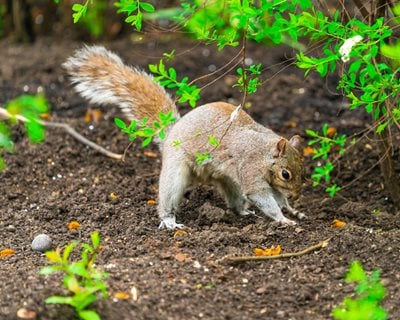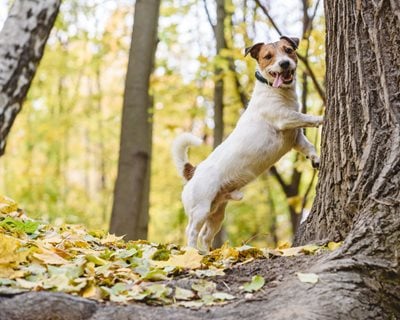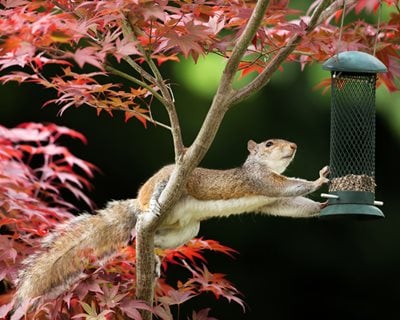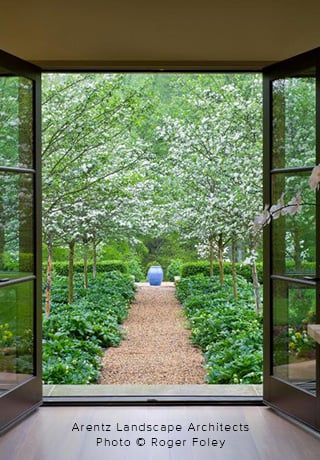How to Keep Squirrels Out of Your Garden
10 ways to stop squirrels from eating plants in your garden
Photo by: BBA Photography / Shutterstock.
Are there small, shallow holes dug in your garden beds? Do you find fruits and vegetables that are half eaten? Have your freshly planted bulbs been dug up? If you answered yes to any (or all) of these, it’s probably squirrel damage. Their rummaging is in full swing in fall when they’re prepping for winter. They'll be back in spring, making the most of new growth and ripening fruit when nuts and seeds are limited.
While many of us enjoy watching squirrels, they can be a serious garden problem, causing extensive damage and terrorizing bird feeders. If you are looking for ways to keep them out of your garden, here are some humane solutions to try:
- Hide or relocate their food. Be diligent about cleaning up fallen nuts, acorns and berries. Make the process faster and easier with a handy nut gatherer. These food sources can be relocated to an area where squirrels are welcome, such as a back corner of your yard (see #7 below). Also, keep trash can lids securely closed as well.
- Get a dog. Most dogs love to chase squirrels. Put them on squirrel patrol and let them scare the squirrels away.
- Turn up their noses. Squirrels are offended by many of the same scents as deer, so repellents like Plantskydd Deer Repellent work well. You can also try a thin layer of coffee grounds or tucking a small amount of dog hair around and under plants.
- Surprise them. Startle and shoo them away with a sudden spray of water from a motion-activated sprinkler or blast of air from an motion-activated air can.
- Employ natural predators. Use a squirrel’s natural predators to your advantage by attracting hawks or owls by placing raptor perches or owl nests nearby. However, this approach is not recommended if you have small animals in the yard that you’d like to keep there.
- Create a barrier. Shield ground crops with row covers, create an enclosure with chicken wire or even build a greenhouse to protect tempting treats from squirrels. Any fencing should be placed up to a foot into the ground to keep squirrels from digging under.
- Use companion plants. Discourage squirrels by surrounding or inter-planting with varieties that they turn their noses up to, like mint, marigolds, nasturtiums, or mustard. You can also try crown imperial bulbs (Fritillaria), but it is recommended that you plant these far away from inhabited areas such as patios or porches because of their strong skunk-like smell.
- Cover the ground. Squirrels don’t particularly like the feel of mulch (especially gravel) under their feet, so add it to garden beds. When used over newly planted bulbs, it can also help disguise the scent of the fresh bulbs. You might also try laying down aluminum foil.
- Give them their own food. Although a disputed method, as this may end up attracting more, giving in to the little guys might just be an option. If you’ve got a large area, make them their own feeding ground that is well away from your garden beds. Use a squirrel feeder to feed them their own sunflower seeds, peanuts, and feed corn. Some gardeners go so far as to plant extra tomatoes to keep them satisfied and away from theirs. You may want to include some of the other squirrel deterrent methods above around bird feeders and garden beds, just in case.
- Give them a drink. If squirrels are munching on your tomatoes or other juicy fruits or vegetables, they may just be thirsty. Theresa Rooney, author of The Guide to Humane Critter Control, says, “During the growing season, provide the squirrels with a dish of fresh water…and the squirrels will probably leave those tomatoes for you to harvest.”

Photo by: alexei_tm / Shutterstock.
If you simply decide to let them run their course (literally) in your yard or garden, Rooney also points out that they will eat fallen seed that won’t sprout into weeds, help trim trees by keeping branches clean, and can even add some humor.
DOES CAYENNE PEPPER KEEP SQUIRRELS AWAY?
Yes, applying a mixture of cayenne or other chili peppers either in a spray or sprinkling around plants can deter squirrels. But, if it gets on their paws and they touch their eyes it can cause pain and even temporary blindness, so we recommend less harmful methods.
WILL MOTHBALLS KEEP SQUIRRELS AWAY?
We've also seen recommendations for using mothballs; however, mothballs are toxic when ingested-not only to squirrels, but also to pets and children, so please do not use them.
WHAT ABOUT TRAPS?
Although squirrel traps may sound like a good idea at the time, especially if you really want them gone, they usually aren’t a sustainable solution. You’re often fighting a losing battle and just making way for more to move into the neighborhood. Another consideration against using traps is that you may be separating a mother squirrel from her babies, especially in spring, leaving them no chance for survival — which, again, may sound acceptable in the moment (depending on your frustration level), but really isn’t a good thing. Also, this practice is prohibited in many areas and you should check with your local Department of Fish and Wildlife first.
TIPS FOR KEEPING SQUIRRELS OUT OF BIRD FEEDERS AND AWAY FROM BULBS
Squirrels love to eat the same nuts and seeds that birds do, and fall-planted bulbs are a treat when squirrels are actively stocking up for winter. Here are a few strategies you can use in addition to those above to keep them from feasting on your bird feeders and bulbs.

Photo by: Giedriius / Shutterstock.
Bird Feeders:
- Use a squirrel-proof bird feeder or add squirrel guards or baffles to existing feeders and poles.
- Keep the area under the bird feeder clean and free of dropped seeds and nuts.
- Place feeders at least 5 to 6 feet off the ground and at least 8 to 10 feet away from any structure (house, fence, shed) that they can use as a launching pad to jump to the feeder.
- Prune trees to keep branches far enough away.
- Feed safflower seeds — the birds like them, but squirrels don’t.
Bulbs:
- Line the bottom, sides, and top of the bulb planting area with hardware cloth (wire mesh) or chicken wire. Cover with soil, then add mulch on the surface. The bulb shoots can make their way up through the mesh, but squirrels can’t make their way down to the bulbs. There are also ready-made bulb cages that can be purchased.
- Cover the surface with plastic netting, then cover with mulch.
- Place some crushed gravel or rock in the planting hole with the bulbs.
- Plant bulbs that squirrels don’t like such as daffodils, alliums, snowdrops, Muscari, Frittilaria, Spanish bluebells, and the fall-blooming autumn crocus. You can plant these varieties solely, intermix them, or outline your planting bed with them.
- Keep your planting area clean from bulb debris. Squirrels have a keen sense of smell and can be attracted to their buried treasure quite easily.
HOW TO KEEP SQUIRRELS FROM EATING PUMPKINS
So you've decorated your fall porch with pumpkins, and the next thing you know they've been devoured by squirrels. Although not their favorite food, they are handy at just the right time of year when squirrels are fattening up for winter. Here are a few methods to try to keep them from destroying your pretty fall display:
- Spray the pumpkins and surrounding area with a repellent, like Liquid Fence.
- Tuck some dog hair around and beneath the pumpkins.
- Scare them off with a motion-activated air blaster. Although, you might want to warn visitors of its presence and be sure to remove it before trick-or-treaters show up.
- Rub the pumpkin with a cloth soaked in apple cider vinegar and even tuck the soaked cloth nearby. Reapply often.
- Mix a solution of 1 part eucalyptus oil and 10 parts water and spray or wipe down the pumpkin. You can also try peppermint oil.
- Add an owl decoy to your decorations to scare them off.
If you're looking to keep them from eating your pumpkins while they're still growing in your garden, try some of the suggestions at the top of the page.
RELATED:
Bulbs 101
Gardening Advice: Squirrels Dining on Your Bulbs?
Deer-Resistant Plants
Rabbits - Natural Ways to Protect Your Garden
